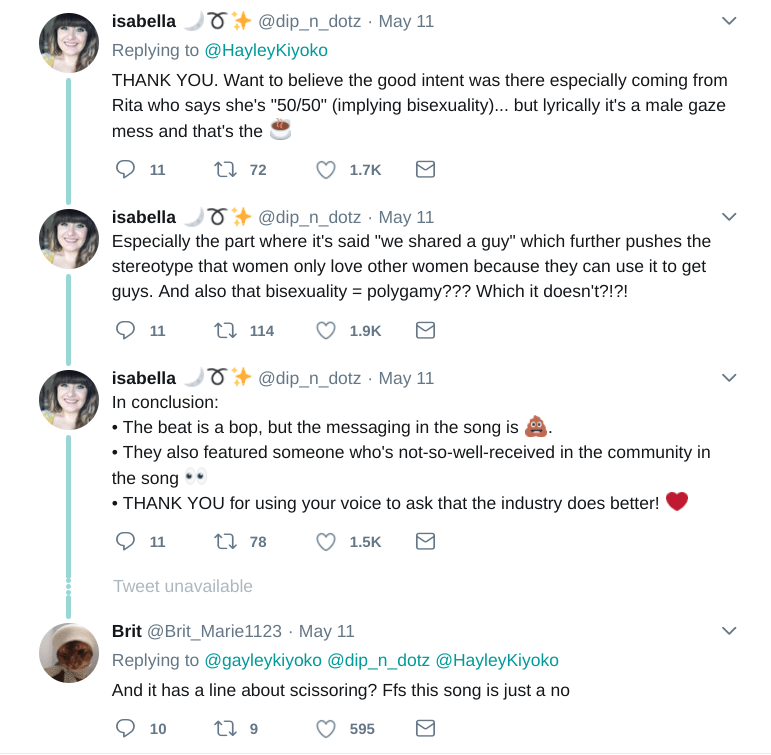Does Rita Ora’s ‘Girls’ Trivialise Bisexuality?
Share:

For many bisexual people, the B in LGBT+ often feels like a silent letter.
Both heterosexual and homosexual people are guilty of erasing bi visibility, by claiming that bisexual people in relationships with people of the opposite gender are not truly LGBT+ or that they just ‘haven’t decided’ on their preferred gender. One of the other main stereotypes surrounding bisexual women, in particular, is that they frequently partake in threesomes- with one of the other two participants typically being a male.
Artists, especially those who do identify as bisexual, cannot include these false perceptions of bisexuality in their work at the risk of future damage to the bi reputation. This is where Rita Ora comes in. Her new song Girls featuring Cardi B, Charlie XCX and Bebe Rexha has sparked a debate online about the way bisexuality is regarded in mainstream media and pop music.
Although Rita Ora does declare that she is actually bisexual (“I’m fifty-fifty and I’m never gonna hide it”), the song does portray girls loving girls as a fun and drunken misbehaviour on a night out, rather than a serious and loving connection between two people. The entire chorus is proof of that:
“Sometimes, I just wanna kiss girls, girls, girls
Red wine, I just wanna kiss girls, girls, girls
Sometimes, I just wanna kiss girls, girls, girls
Red wine, I just wanna kiss girls, girls, girls”
The lyric ‘red wine’ is especially troubling. Bisexual women do not have to use alcohol or other intoxicants to be able to enjoy a sexual experience with another woman.
making a song about kissing girls and only including experiences where they are under the influence or have a male counterpart just furthers the idea that wlw is a fetish for men to enjoy and something women can only enjoy when intoxicated
— peyt (@sapphicthirteen) May 11, 2018
Hayley Kiyoko (called Lesbian Jesus by fans) is a very vocal and active member of the LGBT+ community. She was less-than-impressed with Rita Ora’s new track and posted this statement on Twitter:
https://twitter.com/HayleyKiyoko/status/995026145484689408
While there has been some disagreement, the majority of people seemed to understand what Kiyoko was saying.
If you’re wondering what @dip_n_dotz meant when she said “they also featured someone who’s not-so-well-received in the community”, she is referring to Cardi B. Transgender people consider the word ‘tranny’ to be a slur and a few years ago, Cardi B was called out for using it. Rather than apologise, she responded to the criticism in this manner:
No one can force Cardi B to apologise for saying “tranny”. However it is bizarre that an artist with this background was chosen to feature in a song that was supposed to be an LGBT+ anthem.
Another thing that Twitter picked up on was that the writers of the song were all male with the exception of Belcalis Almanzar (Cardi B) and Ali Tamposi.
It’s written by men & cardi b … *pretends to be shocked* pic.twitter.com/h6vFhv02o7
— COVER GIRL (@luhvely) May 11, 2018
This is further evidence that this song was a portrayal of bisexual women from the viewpoint of a man. This explains the heavy focus on polygamy and male involvement in woman/woman sexual activity.
As Hayley Kiyoko said, artists need to “do better” when creating music about the LGBT+ community rather than perpetuating false and sexualised stereotypes of an entire community of people.


